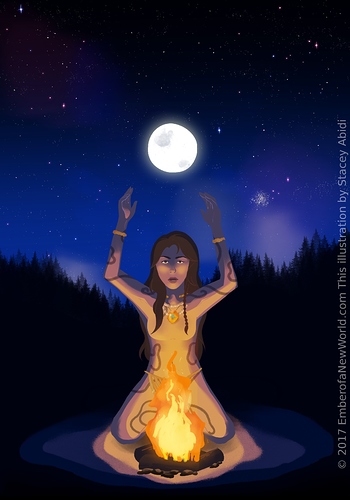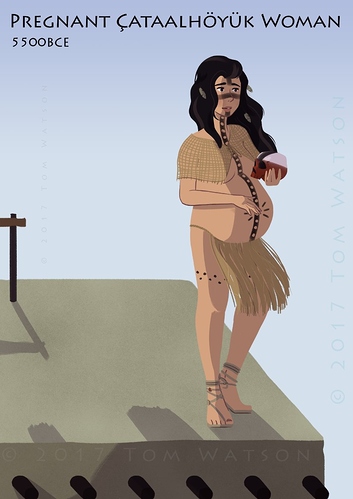I would totally agree with the absence of any deus ex machina in the game - this deus ex machina being a flat modifier being applied that would allow a mathematical result.
One clear case to exemplify this would be if e.g. you make a sacrifice or ritual to any god or spirit related to agriculture and are sure to have a 15% higher harvest, or even have a 50% chance of having 15% harvest if you make this sacrifice or ritual.
However, I think like most of you that religion definitively should have an effect on the society you’re progressively building all along the game.
In my view, religion should serve two purpose in the game:
- unite the society around common values (but there’s nothing said by the devs around some sort of stability mechanism, so leaving that aside);
- define priorities (if you’re nearing the sea shore the society should highly regard everything around fishing; hunting if you’re in a huge forest map; war if you’re a warmonger; farming if the forest disappeared after a time, etc.).
In that sense, I think that this religion discussion echoes what I wrote elsewhere about economic specialization of the societies the nearer you come to Bronze Age. We know for example that Early Neolithic societies had no economic specialties – there were no “potter” per se, only people making ceramics as well as fishing, hunting, farming, etc… During Middle then Final Neolithic, settlements and people became increasingly specialized, when it became obvious that devoting most of their time to make e.g. ceramics or cheese, that could be traded off against another resource, was a viable way to proceed. That’s how whole settlements specialized around cheese, flax fabrics, wool, or flint mining.
What I suggested elsewhere around those economic specialties was to have something like a cap that would prevent any citizen to work more than x% of their time on what would be their favorite activity, the most natural to them according to their competencies. A great hunter should not be able to spend his whole days hunting before the end of Neolithic. Instead, in early game they should be able to work only something like 50% of their time on their favorite task, then with passing time, through e.g. technology progress (let’s say this would be a “social tech”) the cap would be ever higher, until reaching something like 80% of their time devoted to their most natural activity. This way, you could have real fishers, hunters, farmers, miners, etc. And even if warriors were not relevant as a “professional activity” in the Neolithic, nothing prevent you may try to create a warrior society, living by e.g. looting neighboring settlements or forcefully asking tributes to their unfortunate neighbors.
Probably religion should be seen the same way. If you give a huge importance in your game to farming (through rites, monuments, sacred places, etc.), this means you have your society stressing the importance of activities in this field. Having people working more in one peculiar field means they will have higher competencies that can be transmitted to the next generation, etc.
E.g. if you regularly attend farming rituals and have devoted lot of resources on your chiefs burials, this means you’ll have your citizens according more importance to farming and hierarchy, allowing as such your best farmers to use more of their time on farming and allowing higher harvest due to the fact they’re highly skilled, while the burials and hierarchical thing would create a nascent elite and a higher prestige when compared to neighboring settlements, etc.
In my sense, this would allow for a strategic gameplay, provided that each religion-related action would need a serious investment: when you make a farming ritual, that’s not only young boys looking with a natural interest in mind at girls dancing in the fields, that may also be a costly banquet and probably sacrifices reuniting every citizen in a devoted place, a.k.a. sacred place. The same when deciding to stress the importance of chiefs burial, this needs a certain amount of work from the whole community.
In each case, the resources needed for those actions (be it time, people, food, work, etc.) have an obvious cost, so you can’t easily focus on everything in the same time.
In gameplay terms, this means if you decide at first to develop farming so you have more food and more people, you’ll have to wait for developing hunting, fishing or hierarchy. But with your highly productive farmers (as they spend more time they develop higher competencies), you’re able to trade with this neighboring settlement that worked hard on mining.
But you also have to deal with this other settlement that decided to focus early on prestige and elites, and that have the relevant benefits (e.g. more favorable trade deals). This could make your own settlement a simple peripheral of theirs, so you have to decide when the situation’s becoming dangerous for your independence, and when to start launching a prestige race with cultural accomplishments (like building e.g. an enclosure or a menhir).
And, lastly, this would not prevent any polytheistic depiction in game, as you’d have no interest in specializing in one lone field. If you’re a community of highly proficient farmers lacking any other skill, you would have hard time using new techs to build better granaries despite all your neighbors have far more advanced building constructions through their involvement in building or tool-making. The direct consequence is you should define a priority through most impressive rituals and buildings, without forgetting that other aspects should not be utterly forgotten or you’d end up lagging behind, so meaning lot of other minor rituals around hunting, fishing, etc.
(Hmm. Far too long. Once again  )
)


 )
)